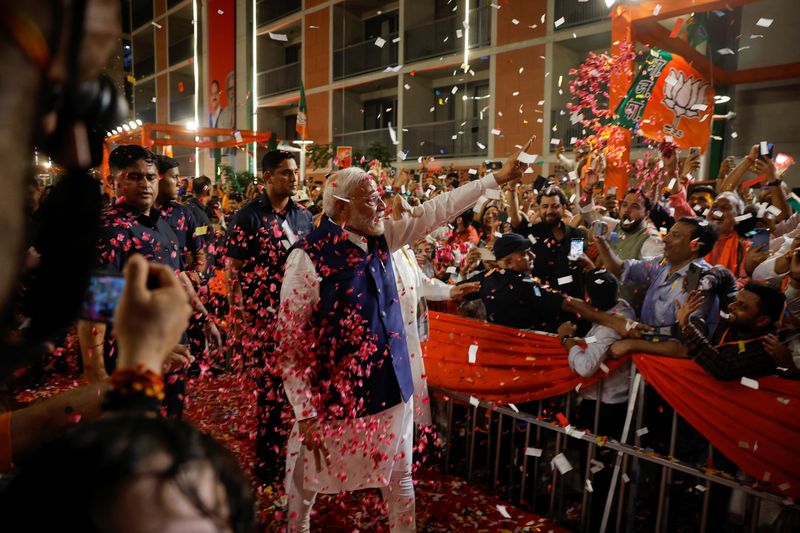By Libby George and Naomi Rovnick
LONDON (Reuters) - Election results in Mexico, South Africa and India jolted currencies and stocks alike, a stark reminder that politics still matter for markets in a year when countries accounting for more than 60% of global economic output and more than half its population will vote.
Attention is now fixed on the U.S. presidential elections in November -- the one race that really counts for everyone from retail investors to world leaders.
Here's a look at what's coming up later this year and at some of the key races that roiled markets in the past week.
1. EUROPE
European Union voters will choose the 720 members of the next European Parliament on June 6-9.
Polls suggest the majorities of the main pro-EU groups - the centre-right, centre-left, Greens and liberals - will shrink at the expense of gains for the far right.
The far-right Chega did well in Portugal's March election, and pollsters tip Belgium's far-right party to do well in June 9 federal elections.
Italian assets could suffer if populist party gains are interpreted as weakening a commitment to European integration.
The euro is largely cushioned by diminished euro-scepticism compared with elections in the 2010s and early 2020s. But an expected rise in eurosceptic lawmakers could make it more difficult to push through support for Ukraine, expand climate change policies or boost international trade.
2. BRITAIN
Ahead of Britain's July 4 general election, polls predict a record win for the centre-left Labour Party. The ruling Conservatives face a landslide defeat after 14 years in power where they oversaw Brexit and a chaotic 2022 mini-Budget.
Investors expect Labour to follow a pro-business agenda, improve relations with the EU and avoid spending splurges, meaning any policy bombshells from opposition leader Keir Starmer could unsettle UK markets.
3. VENEZUELA
President Nicolas Maduro is running for a third term in the July 28 elections - a race the opposition will contest for the first time in a decade after boycotting the 2018 ballot.
Former diplomat Edmundo Gonzalez will run on behalf of a major opposition coalition, after courts upheld a bar on Maria Corina Machado, the winner of the opposition primary, from holding office.
While the United States lifted some sanctions last year, it re-imposed sanctions on the oil industry in April, saying the government had not done enough to make the electoral process fair.
The winner faces a country riven by social, political and economic crises.
4. UNITED STATES
The race for the U.S. presidency on Nov. 5 is running close, even after incumbent Democrat Joe Biden's Republican challenger Donald Trump became the first president to be convicted of a crime.
Trump, who will likely battle to overturn the verdict that he falsified business records to conceal hush money payments to a porn star, is often rated by Americans as better for the economy than Biden, although Goldman Sachs analysts disagree.
Trump's proposal to go further than Biden against China, with a 60% tariff on imports if he wins a second four-year term, would mean higher U.S. inflation and interest rates, UBS reckons.
5. INDIA
India's self-styled strongman Prime Minister Narendra Modi won a record-tying third term, as expected.
But his Hindu nationalist Bharatiya Janata Party (BJP) lost more than 60 seats, a surprise slide that will make Modi more reliant on coalition partners in the National Democratic Alliance.
The result jolted markets, with the NSE Nifty 50 (.NSEI), losing nearly 6%, and the S&P BSE Sensex (.BSESN) falling 5.7%, their steepest drops on an election outcome day since 2004.
6. SOUTH AFRICA
The ruling African National Congress notched the historic loss of majority that most pollsters expected, leading to a fractured government that some say could make it tougher to tackle the myriad issues the country faces.
As ANC leaders sized up which party to align with - the free-marketeer Democratic Alliance (DA), the populist uMkhonto we Sizwe (MK) or the Marxist Economic Freedom Fighters (EFF) - the Rand currency clawed back from its post-election pounding, but has lost more than 1.4% this month.
7. MEXICO
Mexico elected its first female president, Claudia Sheinbaum, but an unexpected supermajority gave the ruling coalition sweeping powers for constitutional changes.

The supermajority for the leftist National Regeneration Movement (Morena) party and its allies would allow them to pass constitutional reforms unpopular with businesses and investors, including in the energy sector.
The Mexican peso took a beating, and closed on Tuesday at its weakest to the dollar since November, while equities also tumbled.